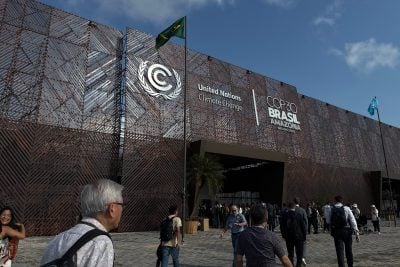For the adolescent girl in Guinea, Ethiopia, or Madagascar who has to miss school to collect firewood before breathing in acrid cooking smoke in an unventilated home, reliable energy access – including clean cooking – would transform her health, her future, and her entire life.
Some 570 million people across Africa, including more than 80 percent of people in Niger, lack electricity access. Paradoxically, it is Europe’s energy crisis that is making headlines, prompting the EU to relax its definition of “green” energy, and Niger has responded by partnering with its neighbors to launch a long-envisioned natural gas pipeline across the Sahara to export gas to Europe.
Yet my friends in the rural village of Sabon Gida, where I lived while serving as a US Peace Corps volunteer in Niger more than 25 years ago, still live without electricity even though sustainable clean energy solutions such as solar are available. Not only would these technologies meet their basic energy needs, they would also help to boost livelihoods and well-being.
Indeed, clean technologies offer enormous potential not just to sustainably power African economies but also to improve the health, education, and well-being of hundreds of millions of people in communities like Sabon Gida across the continent. This is where the support of high-income countries should be directed ahead of the COP27 climate talks.
Given the enormous energy needs across Africa, it stands to reason that fossil fuels may form part of the equation, at least in initially expanding national grids. But with such a nascent sector, African governments together with the international community have the opportunity to embed renewable energy at an early stage, leveraging green innovations to optimize benefits for people and planet.
One obvious win for the early adoption of clean technologies lies in expanding access to clean cooking, which would improve life for the more than 850 million people using solid fuels like wood, charcoal, and crop residues for cooking food – and relieve suffering from the resulting household air pollution, particularly among women and children.
Across 14 countries in sub-Saharan Africa, children under five face a 30 per cent higher risk of dying from household air pollution if their family cooks indoors compared to those where cooking takes place elsewhere.
Scaling up initiatives such as Solar Sister – a women-led distributor of clean cookstoves and solar electricity – and supporting the full adoption of effective, affordable, and user-informed clean cooking would reduce the impact of traditional cookstoves on public health, the environment, and gender equality, a toll which costs an estimated $330 billion a year. And by replicating this worldwide, clean cooking has the potential to reduce emissions by up to a billion metric tons of CO2 equivalent every year between 2020 and 2050.
Meanwhile, pursuing clean geothermal energy in East Africa’s Rift Valley can also help address both rural and urban energy needs while generating additional benefits for social and economic development.
For instance, although Kenya has expanded geothermal production to contribute almost half of the country’s electricity in 2019, the sector’s potential remains largely untapped elsewhere.
By directing more finance to geothermal, high-income countries and donors could support other African countries along the Eastern Africa Rift System to invest in knowledge, skills, and labor to unlock the benefits of geothermal energy, helping sub-Saharan Africa to meet more than 67 per cent of its electricity needs from renewable sources by 2050.
Finally, investing in decentralized and clean off-grid energy technologies can create jobs while also reducing emissions from fossil fuels.
With sufficient policy and financial support, the decentralized renewable energy sector could provide more than 10 times as many jobs in Nigeria by next year as it does today, supporting a rapidly growing workforce.
The impacts of more frequent and severe natural disasters amplified by climate change on those least responsible for it grow starker every year across the African continent. To take just one example, almost half a million people in the eastern forest region of Madagascar, where I used to work, lost crops, homes, and livelihoods after two devastating cyclones earlier this year. Yet, climate investments in the continent are nowhere close to what is needed. From 2019 to 2020, three-quarters of global climate investments were concentrated in Asia-Pacific, Western Europe, and North America.
High-income countries, then, can hardly expect African countries to forgo the use or export of their own natural resources without more dedicated investment of an estimated $70 billion a year to meet their renewable energy needs.
The transition to clean energy worldwide is critical to limiting climate change and must be driven by high-income countries, as well as China and India. But advancing clean energy in Africa is especially important to ensure that populations have the chance to overcome entrenched inequities and thrive in the face of climate change.
For the adolescent girls collecting firewood, and for all young Africans, clean energy can light the way to a healthier, safer, and brighter future.
Kristen P. Patterson is the director of Drawdown Lift, a program at Project Drawdown, a nonprofit organization that seeks to help the world reach “drawdown” – the point in time when levels of greenhouse gases in the atmosphere stop climbing and start to steadily decline.
Want to continue reading? Subscribe today.
You've read all your free articles for this month! Subscribe now to enjoy full access to our content.
Digital Monthly
£8.00 / month
Receive full unlimited access to our articles, opinions, podcasts and more.
Digital Yearly
£70.00 / year
Our best value offer - save £26 and gain access to all of our digital content for an entire year!
 Sign in with Google
Sign in with Google 



